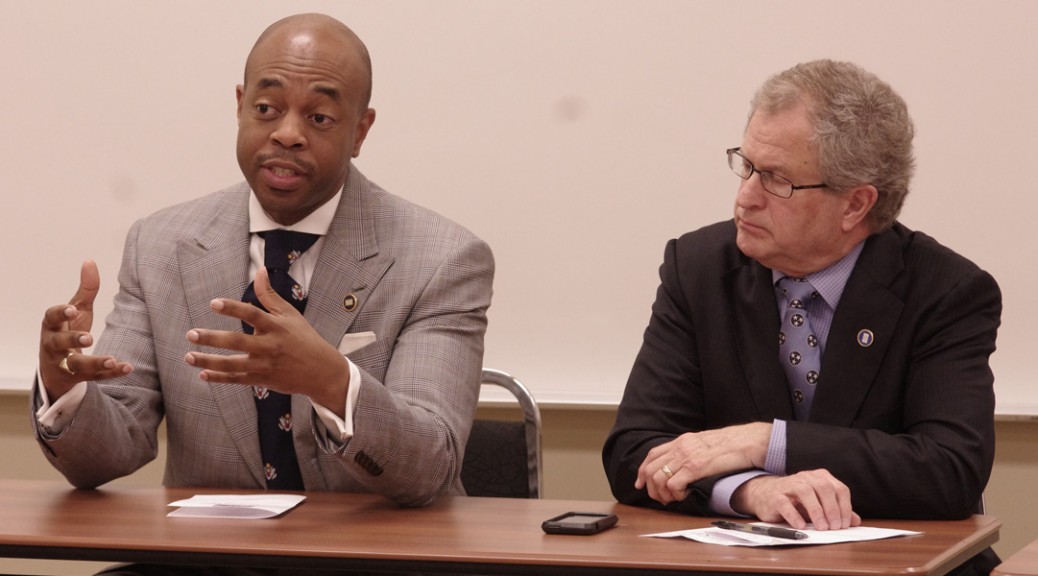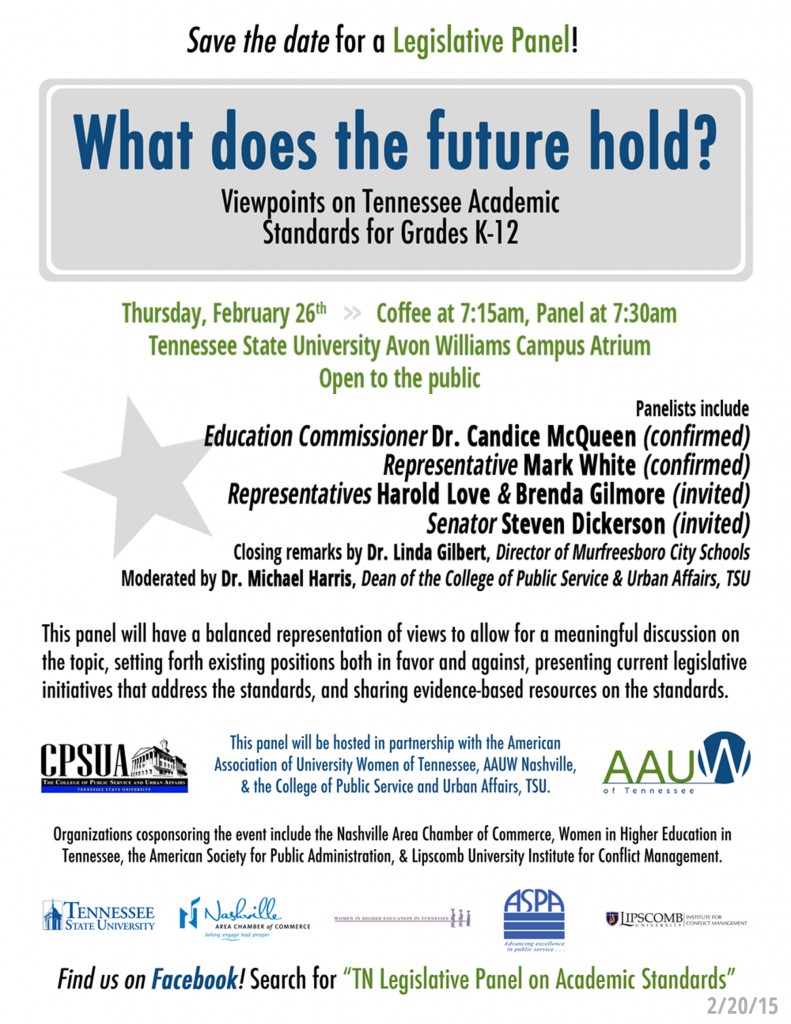
NASHVILLE, Tenn. (TSU News Service) – Without an outright endorsement, a panel of educators and legislators meeting at Tennessee State University Thursday appears to support the position of many who are urging lawmakers to rethink making any changes to the state’s academic standards for grades K-12.
Giving what they called a “balanced” representation of views on one of the biggest and controversial issues facing the Tennessee General Assembly, the panel said the focus should be on preparing students to think beyond graduation either for successful college careers, or technical or trade education that prepares them for the work place.
The panel was part of a forum under the theme, “Viewpoints on Tennessee Academic Standards for K-12,” hosted in partnership with the American Association of University Women of Tennessee, and the College of Public Service and Urban Affairs at TSU. It brought together key members of the House Committee on Education, including Rep. Harold Love Jr. (D-Nashville), member of the Education Instruction, and Programs Standing Committee; and Rep. Mark White (R-Memphis), chair of the Education and Administration Planning Subcommittee.

Dr. Michael Harris, dean of the College of Public Affairs and Urban Planning, who moderated the panel, welcomed participants on behalf of TSU President Glenda Glover, who was away on travel.
In a statement earlier, Tennessee Commissioner of Education, Dr. Candice McQueen, welcomed the discussion on the standards, pointing to the National Assessment of Educational Progress, the Nation’s Report Card, which shows Tennessee as the fastest academically improving state in the nation.
But even with this level of success, the commissioner sees a “widening gap” in the achievement level. She said more than half of the state’s students are from disadvantaged backgrounds who lack the resources to keep pace.
“If we want to be successful then we must find ways to help these disadvantaged students,” she said. “We have to prepare these students to think about success after graduation by steering them toward college or skills sets such as auto mechanic, welding or other trade or technical areas that improve their chances for successful life careers. To achieve this we must develop the ability to work together as K-12 educators and higher education professionals.”
Representative Love, a staunched supporter of education, citing his own late mother’s role as a longtime educator, said he understands the need for fully trained people in the classroom, and parents who are actively engaged in their children’s education.
A proponent of the current K-12 academic standards, Love said the role of the standards should be to prepare students for world-class jobs, which they emphasize.
“The current standards do not need changing,” he said. “Maybe some minor tweaking, but we do not need to change them.”
Responding to a parent’s concern about the lack of resources for their underperforming student, Love called for more funding to provide after-school tutoring for children who need it.
His House Colleague, Rep. White, concurred that students must be prepared to be competitive with the technical and job-ready skills to be successful in the work place.
He also sees no need to change the standards. “Keep the standards in place,” White added.
Another strong proponent of the standards, Dr. Linda Gilbert, director of the Murfreesboro, Tennessee City Schools, said she supports school superintendents who are calling for no change in the standards.
“We are at a crossroad, at the center of which is a child, and we must do everything to provide the environment and learning necessary to make that child successful. We cannot turn back now. …we cannot turn back on education in the state.”
On Tuesday, Feb. 10, 114 superintendents from the state’s 141 school districts presented a letter to lawmakers asking that “no legislative action be taken during the 2015 legislative session to change our academic standards.” This action follows a recent press conference by leaders of all 13 of Tennessee’s community colleges emphasizing their support for the K-12 academic standards.
Many argue, that the success of the recently signed Tennessee Promise law that offers future graduates of any Tennessee high school the opportunity to receive two years of community or technical college tuition-free, hinges on how prepared students are to succeed.
“This is an issue that the public needs to be informed about, and kept abreast on what is facing our schools, our students and our legislators,” Dean Harris said recently as he prepared for today’s forum.
Speaking earlier, the President-elect of the AAUW Tennessee, B. Ayne Cantrell, said her organization, whose mission is to advance equity for women and girls through advocacy, education, philanthropy, and research, was pleased to partner with TSU to host the forum.
The Nashville Area Chamber of Commerce, Women in Higher Education in Tennessee, the American Society for Public Administration, and the Lipscomb University Institute for Conflict management, sponsored the forum.
Tennessee State University
3500 John Merritt Boulevard
Nashville, Tennessee 37209
615.963.5331
About Tennessee State University
With more than 9,000 students, Tennessee State University is Nashville’s only public university, and is a comprehensive, urban, co-educational, land-grant university offering 42 undergraduate, 24 graduate and seven doctoral programs. TSU has earned a top 20 ranking for Historically Black Colleges and Universities according to U.S. News and World Report, and rated as one of the top universities in the country by Washington Monthly for social mobility, research and community service. Founded in 1912, Tennessee State University celebrated 100 years in Nashville during 2012. Visit the University online at tnstate.edu.

